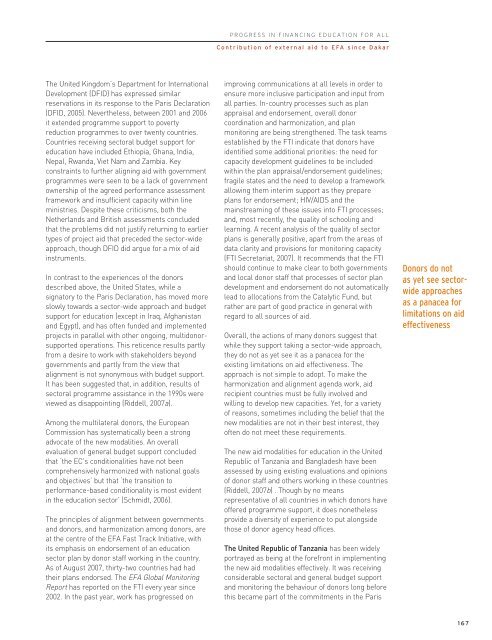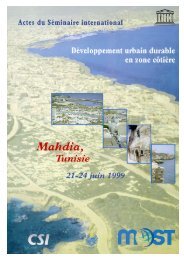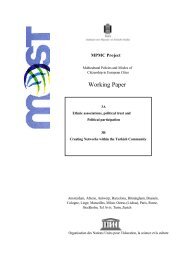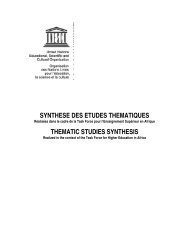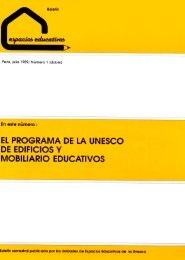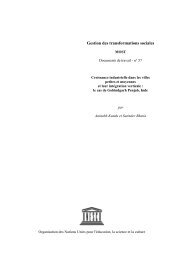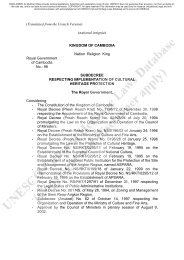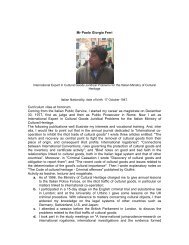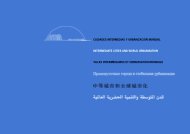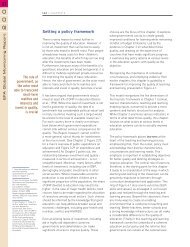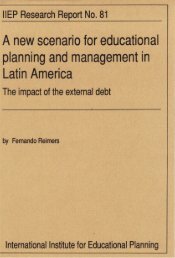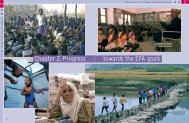Financing Education / pdf - Unesco
Financing Education / pdf - Unesco
Financing Education / pdf - Unesco
You also want an ePaper? Increase the reach of your titles
YUMPU automatically turns print PDFs into web optimized ePapers that Google loves.
PROGRESS IN FINANCING EDUCATION FOR ALL<br />
Contribution of external aid to EFA since Dakar<br />
The United Kingdom’s Department for International<br />
Development (DFID) has expressed similar<br />
reservations in its response to the Paris Declaration<br />
(DFID, 2005). Nevertheless, between 2001 and 2006<br />
it extended programme support to poverty<br />
reduction programmes to over twenty countries.<br />
Countries receiving sectoral budget support for<br />
education have included Ethiopia, Ghana, India,<br />
Nepal, Rwanda, Viet Nam and Zambia. Key<br />
constraints to further aligning aid with government<br />
programmes were seen to be a lack of government<br />
ownership of the agreed performance assessment<br />
framework and insufficient capacity within line<br />
ministries. Despite these criticisms, both the<br />
Netherlands and British assessments concluded<br />
that the problems did not justify returning to earlier<br />
types of project aid that preceded the sector-wide<br />
approach, though DFID did argue for a mix of aid<br />
instruments.<br />
In contrast to the experiences of the donors<br />
described above, the United States, while a<br />
signatory to the Paris Declaration, has moved more<br />
slowly towards a sector-wide approach and budget<br />
support for education (except in Iraq, Afghanistan<br />
and Egypt), and has often funded and implemented<br />
projects in parallel with other ongoing, multidonorsupported<br />
operations. This reticence results partly<br />
from a desire to work with stakeholders beyond<br />
governments and partly from the view that<br />
alignment is not synonymous with budget support.<br />
It has been suggested that, in addition, results of<br />
sectoral programme assistance in the 1990s were<br />
viewed as disappointing (Riddell, 2007a).<br />
Among the multilateral donors, the European<br />
Commission has systematically been a strong<br />
advocate of the new modalities. An overall<br />
evaluation of general budget support concluded<br />
that ‘the EC's conditionalities have not been<br />
comprehensively harmonized with national goals<br />
and objectives’ but that ‘the transition to<br />
performance-based conditionality is most evident<br />
in the education sector’ (Schmidt, 2006).<br />
The principles of alignment between governments<br />
and donors, and harmonization among donors, are<br />
at the centre of the EFA Fast Track Initiative, with<br />
its emphasis on endorsement of an education<br />
sector plan by donor staff working in the country.<br />
As of August 2007, thirty-two countries had had<br />
their plans endorsed. The EFA Global Monitoring<br />
Report has reported on the FTI every year since<br />
2002. In the past year, work has progressed on<br />
improving communications at all levels in order to<br />
ensure more inclusive participation and input from<br />
all parties. In-country processes such as plan<br />
appraisal and endorsement, overall donor<br />
coordination and harmonization, and plan<br />
monitoring are being strengthened. The task teams<br />
established by the FTI indicate that donors have<br />
identified some additional priorities: the need for<br />
capacity development guidelines to be included<br />
within the plan appraisal/endorsement guidelines;<br />
fragile states and the need to develop a framework<br />
allowing them interim support as they prepare<br />
plans for endorsement; HIV/AIDS and the<br />
mainstreaming of these issues into FTI processes;<br />
and, most recently, the quality of schooling and<br />
learning. A recent analysis of the quality of sector<br />
plans is generally positive, apart from the areas of<br />
data clarity and provisions for monitoring capacity<br />
(FTI Secretariat, 2007). It recommends that the FTI<br />
should continue to make clear to both governments<br />
and local donor staff that processes of sector plan<br />
development and endorsement do not automatically<br />
lead to allocations from the Catalytic Fund, but<br />
rather are part of good practice in general with<br />
regard to all sources of aid.<br />
Overall, the actions of many donors suggest that<br />
while they support taking a sector-wide approach,<br />
they do not as yet see it as a panacea for the<br />
existing limitations on aid effectiveness. The<br />
approach is not simple to adopt. To make the<br />
harmonization and alignment agenda work, aid<br />
recipient countries must be fully involved and<br />
willing to develop new capacities. Yet, for a variety<br />
of reasons, sometimes including the belief that the<br />
new modalities are not in their best interest, they<br />
often do not meet these requirements.<br />
The new aid modalities for education in the United<br />
Republic of Tanzania and Bangladesh have been<br />
assessed by using existing evaluations and opinions<br />
of donor staff and others working in these countries<br />
(Riddell, 2007b) . Though by no means<br />
representative of all countries in which donors have<br />
offered programme support, it does nonetheless<br />
provide a diversity of experience to put alongside<br />
those of donor agency head offices.<br />
The United Republic of Tanzania has been widely<br />
portrayed as being at the forefront in implementing<br />
the new aid modalities effectively. It was receiving<br />
considerable sectoral and general budget support<br />
and monitoring the behaviour of donors long before<br />
this became part of the commitments in the Paris<br />
Donors do not<br />
as yet see sectorwide<br />
approaches<br />
as a panacea for<br />
limitations on aid<br />
effectiveness<br />
167


